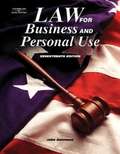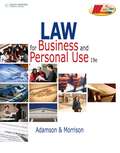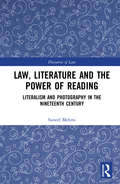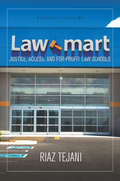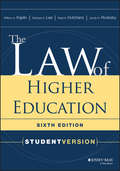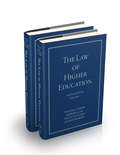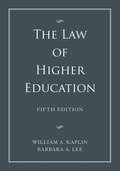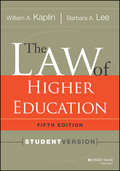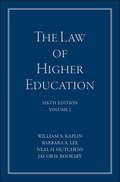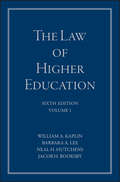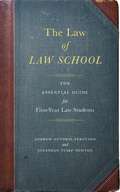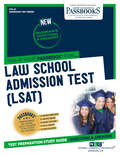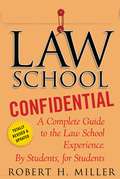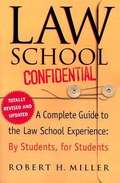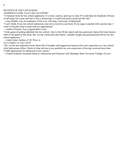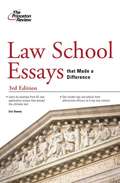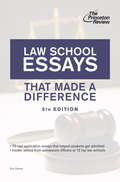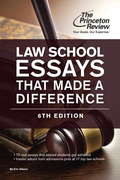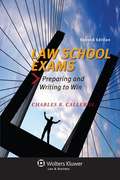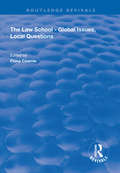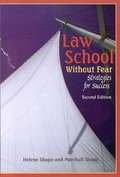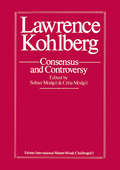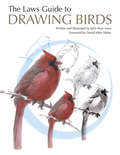- Table View
- List View
Law for Business and Personal Use
by John E. AdamsonAdamson (business, Southwest Missouri State University) outlines the U. S. legal system and explains how various laws apply to the rights and duties of small businesses. The 32 chapters discuss civil procedure, contract law, leasing of real property, wills and trusts, employment law, legal forms of business organization, and financial transactions. Annotation ©2006 Book News, Inc. , Portland, OR (booknews. com)
Law for Business and Personal Use
by John E. Adamson Amanda MorrisonLAW FOR BUSINES AND PERSONAL USE, 19E provides instruction on the foundations of business law as well as the application of legal concepts to everyday life.
Law, Literature and the Power of Reading: Literalism and Photography in the Nineteenth Century
by Suneel MehmiAt the intersection of law, literature and history, this book interrogates how a dominant contemporary idea of law emerged out of specific ideas of reading in the nineteenth century. Reading shapes our identities. How we read shapes who we are. Reading also shapes our conceptions of what the law is, because the law is also a practice of reading. Focusing on the works of key Victorian writers closely associated with legal practice, this book addresses the way in which the identity of the reader of law has been modelled on the identity of the political elite. At the same time, it shows how other readers of law have been marginalized. The book thus shows how a construction of the law has emerged from the ordering of a power that discriminates between different readers and readings. More specifically, and in response to the emerging media of photography – and, with it, potentially subversive ideas of exposure and visibility – the book shows that there have been dominant, hidden and unrecognised guides to legal reading and to legal thought. And in making these visible, the book also aims to make them contestable. This secret history of law will appeal to legal historians, legal theorists, those working at the intersection of law and literature and others with interests in law and the visual.
Law Mart: Justice, Access, and For-Profit Law Schools
by Riaz TejaniAmerican law schools are in deep crisis. Enrollment is down, student loan debt is up, and the profession's supply of high-paying jobs is shrinking. Meanwhile, thousands of graduates remain underemployed while the legal needs of low-income communities go substantially unmet. Many blame overregulation and seek a "free" market to solve the problem, but this has already been tested. Seizing on a deregulatory policy shift at the American Bar Association, private equity financiers established the first for-profit law schools in the early 2000s with the stated mission to increase access to justice by "serving the underserved". Pursuing this mission at a feverish rate of growth, they offered the promise of professional upward mobility through high-tech, simplified teaching and learning. In Law Mart, a vivid ethnography of one such environment, Riaz Tejani argues that the rise of for-profit law schools shows the limits of a market-based solution to American access to justice. Building on theories in law, political economy, and moral anthropology, Tejani reveals how for-profit law schools marketed themselves directly to ethnoracial and socioeconomic "minority" communities, relaxed admission standards, increased diversity, shook up established curricula, and saw student success rates plummet. They contributed to a dramatic rise in U.S. law student debt burdens while charging premium tuition financed up-front through federal loans over time. If economic theories have so influenced legal scholarship, what happens when they come to shape law school transactions, governance, and oversight? For students promised professional citizenship by these institutions, is there a need for protections that better uphold institutional quality and sustainability? Offering an unprecedented glimpse of this landscape, Law Mart is a colorful foray into these essential questions.
The Law Of Disability Discrimination For Higher Educational Professionals
by Ruth Colker Paul GrossmanThe purpose of The Law of Disability Discrimination for Higher Education Professionals is to provide an in-depth understanding of the ADA and related statutes to the many individuals who are responsible for disability equality in higher education: disabled student services directors, ADA officers, house and contract counsel, human resource directors, college grievances officers, ombudspersons, federal and state compliance agents, organizational advocates, health and counseling service personnel, deans and faculty, etc.
The Law of Higher Education: Student Version (The\jossey-bass Higher And Adult Education Ser.)
by William A. Kaplin Barbara A. Lee Neal H. Hutchens Jacob H. RooksbyA single-volume text that distills information for students Based on the sixth edition of Kaplin and Lee’s indispensable guide to the law that bears on the conduct of higher education, The Law of Higher Education, Sixth Edition: Student Version provides an up-to-date reference and guide for coursework in higher education law and programs preparing law students and higher education administrators for leadership roles. This student edition discusses the most significant areas of the law for college and university attorneys and administrators. Each chapter is introduced by a discussion of key terms and topics the students will encounter, and the book includes materials from the full sixth edition that are most relevant to student interests and classroom instruction. It also contains a “crosswalk” that keys sections of the Student Edition to counterpart sections of the two-volume treatise. Complements the full version Includes a glossary of legal terms and an appendix on how to read legal material for students without legal training Discusses key terms in each chapter Concentrates on key topics students will need to know This is fundamental reading for law students preparing for careers in higher education law and for graduate students in higher education administration programs.
The Law of Higher Education: Student Version (The\jossey-bass Higher And Adult Education Ser.)
by William A. Kaplin Barbara A. Lee Neal H. Hutchens Jacob H. RooksbyYour must-have resource on the law of higher education Written by recognized experts in the field, the latest edition of The Law of Higher Education offers college administrators, legal counsel, and researchers with the most up-to-date, comprehensive coverage of the legal implications of administrative decision making. In the increasingly litigious environment of higher education, William A. Kaplin and Barbara A. Lee's clear, cogent, and contextualized legal guide proves more and more indispensable every year. Two new authors, Neal H. Hutchens and Jacob H Rooksby, have joined the Kaplin and Lee team to provide additional coverage of important developments in higher education law. From hate speech to student suicide, from intellectual property developments to issues involving FERPA, this comprehensive resource helps ensure you're ready for anything that may come your way. Includes new material since publication of the previous edition Covers Title IX developments and intellectual property Explores new protections for gay and transgender students and employees Delves into free speech rights of faculty and students in public universities Expands the discussion of faculty academic freedom, student academic freedom, and institutional academic freedom If this book isn't on your shelf, it needs to be.
The Law of Higher Education, 2 Volume Set
by William A. Kaplin Barbara A. LeeMake sure you have a copy on your bookshelf.The Law of Higher Education, Fifth Edition, is the most up-to-date and comprehensive reference, research source, and practical legal guide for college and university administrators, campus attorneys, legal counsel, and institutional researchers, addressing all the major legal issues and regulatory developments in higher education.In the increasingly litigious environment of higher education, William A. Kaplin and Barbara A. Lee's clear, cogent, and contextualized legal guide proves more and more indispensable every year.Over 3,000 new cases related to higher education have been decided since the publication of the previous edition, and scores of changes to higher education law are made each year. Every section of the fifth edition contains new material, including those related to:Hate speech and free speech rights of faculty in public universitiesSharing of research with international colleaguesIntellectual property and peer-to-peer file sharingStudent suicideCampus safetyPolice and administrators' right to search students' residence hall roomsGovernmental support for religious institutions and religious autonomy rights of individual public institutionsCollective bargaining and antidiscrimination lawsNondiscrimination and affirmative action in employment, admissions, and financial aidFamily and Medical Leave Act and workers' compensationFERPA (Family Educational Rights and Privacy Act)
The Law of Higher Education, 5th Edition
by Barbara A. Lee William A. KaplinBased on the fifth edition of the indispensable guide to the laws that bear on the conduct of higher education, this student edition provides an up-to-date textbook, reference, and guide for coursework in higher education law and programs preparing higher education administrators for leadership roles. This student edition contains a glossary of key terms and an appendix on how to read legal material for the non-law student. Each chapter is introduced by a discussion of key terms and ideas the students will encounter.
The Law of Higher Education, A Comprehensive Guide to Legal Implications of Administrative Decision Making: Student Version (The\jossey-bass Higher And Adult Education Ser.)
by William A. Kaplin Barbara A. Lee Neal H. Hutchens Jacob H. RooksbyYour must-have resource on the law of higher education Written by recognized experts in the field, the latest edition of The Law of Higher Education, Vol. 2 offers college administrators, legal counsel, and researchers with the most up-to-date, comprehensive coverage of the legal implications of administrative decision making. In the increasingly litigious environment of higher education, William A. Kaplin and Barbara A. Lee’s clear, cogent, and contextualized legal guide proves more and more indispensable every year. Two new authors, Neal H. Hutchens and Jacob H Rooksby, have joined the Kaplin and Lee team to provide additional coverage of important developments in higher education law. From hate speech to student suicide, from intellectual property developments to issues involving FERPA, this comprehensive resource helps ensure you’re ready for anything that may come your way. Includes new material since publication of the previous edition Covers Title IX developments and intellectual property Explores new protections for gay and transgender students and employees Delves into free speech rights of faculty and students in public universities Expands the discussion of faculty academic freedom, student academic freedom, and institutional academic freedom Part of a 2 volume set If this book isn’t on your shelf, it needs to be.
The Law of Higher Education, A Comprehensive Guide to Legal Implications of Administrative Decision Making: Student Version (The\jossey-bass Higher And Adult Education Ser.)
by William A. Kaplin Barbara A. Lee Neal H. Hutchens Jacob H. RooksbyYour must-have resource on the law of higher education Written by recognized experts in the field, the latest edition of The Law of Higher Education, Vol. 1 offers college administrators, legal counsel, and researchers with the most up-to-date, comprehensive coverage of the legal implications of administrative decision making. In the increasingly litigious environment of higher education, William A. Kaplin and Barbara A. Lee’s clear, cogent, and contextualized legal guide proves more and more indispensable every year. Two new authors, Neal H. Hutchens and Jacob H Rooksby, have joined the Kaplin and Lee team to provide additional coverage of important developments in higher education law. From hate speech to student suicide, from intellectual property developments to issues involving FERPA, this comprehensive resource helps ensure you’re ready for anything that may come your way. Includes new material since publication of the previous edition Covers Title IX developments and intellectual property Explores new protections for gay and transgender students and employees Delves into free speech rights of faculty and students in public universities Expands the discussion of faculty academic freedom, student academic freedom, and institutional academic freedom Part of a 2 volume set If this book isn’t on your shelf, it needs to be.
The Law of Law School: The Essential Guide for First-Year Law Students
by Andrew Guthrie Ferguson Jonathan Yusef NewtonOffers one hundred rules that every first year law student should live by“Dear Law Student: Here’s the truth. You belong here.” Law professor Andrew Ferguson and former student Jonathan Yusef Newton open with this statement of reassurance in The Law of Law School. As all former law students and current lawyers can attest, law school is disorienting, overwhelming, and difficult. Unlike other educational institutions, law school is not set up simply to teach a subject. Instead, the first year of law school is set up to teach a skill set and way of thinking, which you then apply to do the work of lawyering. What most first-year students don’t realize is that law school has a code, an unwritten rulebook of decisions and traditions that must be understood in order to succeed.The Law of Law School endeavors to distill this common wisdom into one hundred easily digestible rules. From self-care tips such as “Remove the Drama,” to studying tricks like “Prepare for Class like an Appellate Argument,” topics on exams, classroom expectations, outlining, case briefing, professors, and mental health are all broken down into the rules that form the hidden law of law school. If you don’t have a network of lawyers in your family and are unsure of what to expect, Ferguson and Newton offer a forthright guide to navigating the expectations, challenges, and secrets to first-year success. Jonathan Newton was himself such a non-traditional student and now shares his story as a pathway to a meaningful and positive law school experience. This book is perfect for the soon-to-be law school student or the current 1L and speaks to the growing number of first-generation law students in America.
Law School 101
by R. Stephanie GoodEverything you need to know to excel in your first year of law school and beyond. Whether you are thinking about law school, have already applied and been accepted, or started your first year, you need to know what to expect in law school and how to succeed. Law School 101 gives an honest look at the law school experience from someone who has been there, and tells students what they should really expect. It also helps students develop the skills necessary to survive the challenges and excel in their program. It includes the survival skills you need in key areas, including: Handling the pressure of law school What to expect from your classes and professors How to study for and pass your law school exams Job information for first and second year students Avoid common pitfalls, decode law school myths, and achieve your dream.
LAW SCHOOL ADMISSION TEST: Passbooks Study Guide (Admission Test Series)
by National Learning CorporationThe Admission Test Series prepares students for entrance examinations into college, graduate and professional school as well as candidates for professional certification and licensure. The Law School Admission Test (LSAT) Passbook® prepares you by sharpening the skills and abilities necessary to succeed on your upcoming entrance exam. It provides hundreds of questions and answers in the areas that will likely be covered on your upcoming exam, including but not limited to: reading comprehension; analytical reasoning; logical reasoning; legal aptitude; and more.
Law School Confidential: A Complete Guide to the Law School Experience: By Students, for Students
by Robert H. MillerI WISH I KNEW THEN WHAT I KNOW NOW!Don't get to the end of your law school career muttering these words to yourself! Take the first step toward building a productive, successful, and perhaps even pleasant law school experience--read this book!Written by students, for students, Law School Confidential has been the "must-have" guide for anyone thinking about, applying to, or attending law school for more than a decade. And now, in this newly revised third edition, it's more valuable than ever. This isn't the advice of graying professors or battle-scarred practitioners long removed from law school. Robert H. Miller has assembled a blue-ribbon panel of recent graduates from across the country to offer realistic and informative firsthand advice about what law school is really like.This updated edition contains the very latest information and strategies for thriving and surviving in law school--from navigating the admissions process and securing financial aid, choosing classes, studying and exam strategies, and securing a seat on the law review to getting a judicial clerkship and a job, passing the bar exam, and much, much more. Newly added material also reveals a sea change that is just starting to occur in legal education, turning it away from the theory-based platform of the previous several decades to a pragmatic platform being demanded by the rigors of today's practices.Law School Confidential is a complete guide to the law school experience that no prospective or current law student can afford to be without.
Law School Confidential
by Robert M. MillerIt provides a comprehensive, chronological account of what to expect at every stage of law school experience. This new, completely revised and updated edition contains the very latest information and strategies for thriving in law school.
The Law School Decision Game: A Playbook for Prospective Lawyers
by Ann K. LevineWhether you’re considering law school or are already committed, "The Law School Decision Game: A Playbook for Prospective Lawyers" explains your choice to enter the legal profession with the candor readers have come to expect from Ann Levine's Law School Expert blog including: <p><p>•What lawyers do, how much money they make, and how hard they work. <p>•What’s important in choosing a law school. <p>•What BigLaw is really like.•What to consider before taking on student loan debt in today's job market. <p>•What you can do now to increase your likelihood of getting hired later. <p>•What is important in choosing an area of specialization. <p>•What you need to know and do in law school and in the first few years of your career to set yourself up for success.
Law School Essays That Made a Difference
by Eric OwensOne of the best ways to stand out in a crowd of applicants to law school is to write an exceptional personal statement. Law School Essays That Made a Difference, 3rd Edition, contains 70 real application essays as well as interviews with admissions pros and with students who've been through the process and made it to law school.
Law School Essays That Made a Difference, 5th Edition
by Princeton ReviewStand out in a crowd of law school applicants with an outstanding personal statement. Law schools are receiving more applications than ever with high LSAT scores and excellent grades. To get in, you also need a personal statement that shines. The fifth edition of Law School Essays That Made a Difference gives you the tools to do just that. It includes: * 70 real essays written by 62 unique future lawyers attending Columbia, Cornell, Duke, Georgetown, Harvard, Northwestern, Vanderbilt, Yale, and other top law schools--along with each applicant's test scores, GPA, and admissions profile * An overview of law school admissions and a "crash course" in prepping your application * Insider advice: Interviews with admissions pros at Berkeley, Cornell, Duke, Georgetown, Northwestern, Texas Tech, UCLA, University of Kansas, University of Michigan, UPenn, University of Richmond, and William & Mary Law School Essays That Made a Difference, 5th Edition includes essays written by students who enrolled at the following schools:Amherst CollegeBard CollegeBarnard CollegeBoston CollegeBrown UniversityBryn Mawr CollegeCalifornia Institute of TechnologyClaremont McKenna CollegeCornell UniversityDartmouth CollegeDuke UniversityEmerson CollegeFranklin W. Olin College ofEngineeringGeorgetown UniversityHarvard CollegeMassachusetts Institute ofTechnologyMiddlebury CollegeNew College of FloridaNew York UniversityNorthwestern UniversityPomona CollegePrinceton UniversityRice UniversitySmith CollegeStanford UniversitySwarthmore CollegeUniversity of California--San DiegoUniversity of Notre DameUniversity of PennsylvaniaWashington and Lee UniversityWellesley CollegeWesleyan UniversityYale University
Law School Essays That Made a Difference, 6th Edition
by Princeton ReviewThe inside word on law school admissions.To get into a top law school, you need more than high LSAT scores and excellent grades--you also need a personal statement that shines. Law School Essays That Made a Difference, 6th Edition, gives you the tools to craft just that. This book includes:* 70 real essays written by 63 unique law students attending Columbia, Harvard, Northwestern, Vanderbilt, and other top law schools--along with each applicant's test scores, GPA, and admissions profile * An overview of law school admissions and tips for prepping your applications* Insider advice: Interviews with admissions pros at 17 top law schools, including Berkeley, Northwestern, UCLA, and many moreLaw School Essays That Made a Difference, 6th Edition, includes essays written by students who enrolled at the following law schools:American University Washington College of LawBoston College Law SchoolBoston University School of LawColumbia University School of LawCornell University School of LawDuke University School of LawEmory University School of LawGeorgetown University Law CenterHarvard University Law SchoolNew York University School of LawNorthwestern University School of LawThe University of Chicago Law SchoolUniversity of Michigan Law SchoolUniversity of Pennsylvania Law SchoolUniversity of Virginia Law SchoolYale University Law SchoolFrom the Trade Paperback edition.
Law School Exams: Preparing and Writing to Win
by Charles CallerosOverview Law School Study Techniques Preparing for Exams Taking Law School Exams
The Law School - Global Issues, Local Questions: Global Issues, Local Questions (Routledge Revivals)
by Fiona CownieFirst published in 1999, this international collection of essays on legal education addresses the following issues: The Law School and the University. Research into legal education has often been regarded as a marginal activity as compared with research into substantive areas of law. However, recent years have seen a growing interest in discussions about the purpose of the university law school and the ways in which law is taught within it. Are we educating professional lawyers or legal scholars? What do we really mean when we say we want to offer ‘a liberal education in the law’? What effect are the current changes in higher education funding and policy having on law schools and what takes place within them? The international group of scholars who have contributed to this collection come from very different jurisdictions, but they have written about topics which, while they have local resonances, are of concern globally. Global Issues, Local Questions addresses matters which concern all law teachers, whatever their field of substantive legal expertise.
Law School Without Fear: Strategies For Success
by Helene Shapo Marshall ShapoWith a total of 50 years of experience teaching law school between them, the authors of Law School Without Fear offer law students strategies for coping with law school successfully and advice on how to get the most out the law school experience. The book discusses in simple terms what students need to know about law school, covering common problems that law students encounter and solutions to those problems. Topics covered include briefing a case, precedent and how to use it, balancing competing interests and factors, legal writing, and psychological tips for the study of law. Special features include a comprehensive approach to the first year, from the bewildering first day of class through examinations; advice on how to study, how to deal with the classroom experience, and how to take exams; wonderfully brief summaries of fundamental ideas of policy common to almost all law classes; and glossary of frequently used words and phrases.
Lawrence Kohlberg
by Mark WoodwardFirst published in 1986. Routledge is an imprint of Taylor & Francis, an informa company.
The Laws Guide to Drawing Birds
by John Muir LawsJohn Muir Laws’s guide to drawing birds is itself winged, soaring between a devotion not only to art but also to the lives, forms, and postures of the birds themselves. Here, artistic technique and the exquisite details of natural history intertwine, and drawing becomes the vehicle for seeing. As Laws writes, “To draw feathers, you must understand how feathers grow, overlap, and insert into the body. To create the body, you must have an understanding of the bird’s skeletal structure. To pose this skeleton, you must be able to perceive the energy, intention, and life of the bird.” This how-to guide will perfect the technique of serious arists but also, perhaps more importantly, it will provide guidance for those who insist they can’t draw. Leading the mind and hand through a series of detailed exercises, Laws delivers what he promises: that “drawing birds opens you to the beauty of the world.” An Audubon Book.
